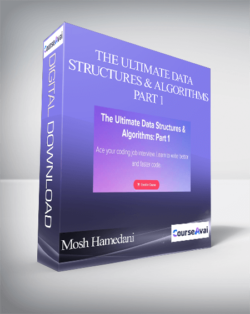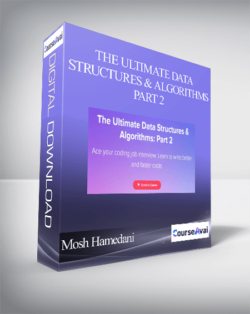Studied Computer Science – but never really understood the complex topic of data structures and algorithms?Or maybe you’re a self-taught programmer, with little to no knowledge of this important topic.Or perhaps you failed a job interview because you couldn’t answer basic data structure and algorithm questions.Purchase Mosh Hamedani – The Ultimate Data Structures & Algorithms: Part 2 courses at here with PRICE $10 $5Mosh Hamedani – The Ultimate Data Structures & Algorithms: Part 2Studied Computer Science – but never really understood the complex topic of data structures and algorithms?Or maybe you’re a self-taught programmer, with little to no knowledge of this important topic.Or perhaps you failed a job interview because you couldn’t answer basic data structure and algorithm questions.So, why are data structures so important these days?Data structures and algorithms are patterns for solving problems. Developers who know more about data structures and algorithms are better at solving problems. That’s why companies like Google, Microsoft and Amazon always include interview questions on data structures and algorithms. They want to assess your problem-solving skills. They don’t care how many programming languages and frameworks you’re familiar with.A complex topic made simpleThat’s why I made this course. I want to demystify data structures and algorithms once and for all.I remember being hopelessly confused when my college lecturer tried to teach it, many moons ago. So I had to teach myself. Now I’m an expert on the topic, and I want to save you the dozens of hours I wasted at the library trying to wrap my head around it.By the end of this course…You’ll be able to:Ace your next coding interviewWrite better, faster codeBecome a better developerImprove your problem solving skillsMaster computer science fundamentalsImplement all the essential data structures from scratchMaster dozens of popular algorithmsWhat you’re going to learnThis course is the second of a series. In the first part, we covered the linear data structures (Arrays, Linked Lists, Stacks, Queues and Hash Tables). In this part, we’ll be focusing on non-linear data structures. Part 3 is about searching, sorting and string manipulation algorithms.Here’s what you’re going to learn in this part:Binary TreesAVL TreesHeapsTriesGraphsThis is the most comprehensive data structures and algorithms series online. Every example and exercise is picked from popular interview questions asked by Google, Microsoft, Amazon and other big companies.Who is this course for?Anyone preparing for a coding job interviewComputer science students whose lecturers failed to explain the topicsSelf-taught developers who missed out on a computer science degreeAnyone who wants to become a better developerCourse CurriculumGetting StartedStart1- Introduction (0:50)Start2- Source CodeBinary Trees (73m)Preview1- Introduction (0:55)Preview2- What are Trees (5:36)Preview3- Exercise- Populating a Binary Search TreePreview4- Exercise- Building a Tree (2:41)Preview5- Solution- insert() (7:44)Preview6- Solution- find() (2:00)Start7- Traversing Trees (5:58)Start8- Exercise- Tree TraversalStart9- Recursion (5:39)Start10- Depth First Traversals (5:23)Start11- Depth and Height of Nodes (7:06)Start12- Minimum Value in a Tree (7:37)Start13- Exercise- Equality Checking (0:45)Start14- Solution- Equality Checking (4:08)Start15- Exercise- Validating Binary Search Trees (4:14)Start16- Solution- Validating Binary Search Trees (4:18)Start17- Exercise- Nodes at K Distance (1:48)Start18- Solution- Nodes at K Distance from the Root (4:37)Start19- Level Order Traversal (2:55)Start20- Trees- ExercisesStart21- Summary (1:22)AVL Trees (49m)Start1- Introduction (0:31)Start2- Balanced and Unbalanced Trees (3:01)Start3- Rotations (5:02)Start4- AVL Trees (4:04)Start5- Exercise: AVL RotationsStart6- Exercise- Building an AVL Tree (1:11)Start7- Solution- insert() (8:47)Start8- Exercise- Height Calculation (1:24)Start9- Solution- Height Calculation (2:43)Start10- Exercise- Balance Factor (2:04)Start11- Solution- Balance Factor (4:01)Start12- Exercise- Detecting Rotations (2:54)Start13- Solution- Detecting Rotations (3:32)Start14- Exercise- Implementing Rotations (3:51)Start15- Solution- Implementing Rotations (5:40)Start16- AVL Trees- ExercisesStart17- Summary (1:01)StartA Quick NoteHeaps (53m)Start1- Introduction (0:21)Start2- What are Heaps (6:28)Start3- Exercise- Working with HeapsStart4- Exercise- Building a Heap (1:55)Start5- Solution- insert() (8:24)Start6- Solution- remove() (7:07)Start7- Solution – Edge Cases (6:11)Start8- Heap Sort (2:29)Start9- Priority Queues (5:04)Start10- Exercise- Heapify (1:26)Start11- Solution- Heapify (7:12)Start12- Solution- Optimization (2:42)Start13- Exercise- Kth Largest Item (0:31)Start14- Solution- Kth Largest Item (3:47)Start15- Heaps- ExercisesStart16- Summary (1:19)Tries (46m)Start1- Introduction (0:30)Start2- What are Tries (3:50)Start3- Exercise- Populating a TrieStart4- Exercise- Building a Trie (3:03)Start5- Solution- Building a Trie (5:44)Start6- An Implementation with a HashTable (1:50)Start7- A Better Abstraction (5:28)Start8- Exercise- Looking Up a Word (1:12)Start9- Solution- Looking Up a Word (2:35)Start10- Traversals (3:35)Start11- Exercise- Removing a Word (1:53)Start12- Solution- Removing a Word (8:14)Start13- Exercise- Auto Completion (2:51)Start14- Solution- Auto Completion (5:59)Start15- Tries- ExercisesStart16- Summary (0:45)StartA Quick NoteGraphs (66m)Start1- Introduction (0:26)Start2- What are Graphs (2:09)Start3- Adjacency Matrix (4:14)Start4- Adjacency List (6:32)Start5- Exercise- Building a Graph (1:50)Start6- Solution- Adding Nodes and Edges (7:34)Start7- Solution- Removing Nodes and Edges (4:48)Start8- Traversal Algorithms (3:58)Start9- Exercise- Traversal AlgorithmsStart10- Exercise- Depth-first Traversal (Recursive) (1:29)Start11- Solution- Depth-first Traversal (Recursive) (3:44)Start12- Exercise- Depth-first Traversal (Iterative) (2:44)Start13- Solution- Depth-first Traversal (Iterative) (3:59)Start14- Exercise- Breadth-first Traversal (Iterative) (1:18)Start15- Solution- Breadth-first Traversal (2:41)Start16- Exercise- Topological Sorting (5:06)Start17- Solution- Topological Sort (4:05)Start18- Exercise- Cycle Detection (Directed Graphs) (3:42)Start19- Solution- Cycle Detection (Directed Graphs) (6:26)Start20- Graphs Summary (1:02)Undirected Graphs (59m)Start1- Introduction (0:26)Start2- Exercise- Weighted Graphs (1:30)Start3- Solution- Weighted Graphs (5:20)Start4- An Object-oriented Solution (6:13)Start5- Dijkstra’s Shortest Path Algorithm (4:35)Start6- Exercise- Getting the Shortest Distance (6:08)Start7- Solution- The Shortest Distance (5:27)Start8- Solution- Shortest Path (7:53)Start9- Exercise- Cycle Detection (Undirected Graphs) (2:03)Start10- Solution- Cycle Detection (Undirected Graphs) (4:42)Start11- Minimum Spanning Tree (1:56)Start12- Exercise- Prim’s Algorithm (2:45)Start13- Solution- Prim’s Algorithm (10:39)Start14- Course Wrap Up (0:30)Start15- Thank YouSale page: Mosh Hamedani – The Ultimate Data Structures & Algorithms: Part 2Purchase Mosh Hamedani – The Ultimate Data Structures & Algorithms: Part 2 courses at here with PRICE $10 $5
 Ben Williams – Anything
₹1,328.00
Ben Williams – Anything
₹1,328.00
 Mosh Hamedani – The Ultimate Data Structures & Algorithms: Part 1
₹830.00
Mosh Hamedani – The Ultimate Data Structures & Algorithms: Part 1
₹830.00
Mosh Hamedani – The Ultimate Data Structures & Algorithms: Part 2
₹830.00






